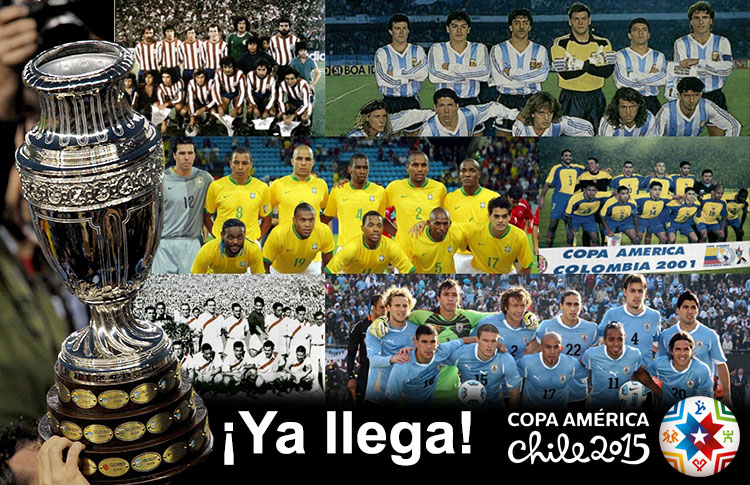As we draw near Chile's 2015 Copa America Tournament, CONMEBOL.com offers our readers a summary of results, statistics and facts about past editions.
Year: 1916
Country: Argentina
Headquarters: Buenos Aires
Final: There was no final, as it was a tournament of all against all. Uruguay became champions with a draw against Argentina (0-0) on the final date.
Top Scorer: Isabelino Gradín, Uruguay, 3
Matches: 6
Goals scored: 18
Average goals: 3 per match
Facts:
Brazil was winning against Uruguay 1-0 in the 16th minute when suddenly they were left with 10 players due to Orlando's injury. His companions asked Uruguayans to replace him, but the captain, José Pacheco, opposed on the grounds that changes were not allowed. Uruguay won 2-1.
Chilean referee, Carlos Fanta, also was the coach of the national team. For its part, Brazilian footballer, Sidney Pullen, also acted as a referee in the competition.
Year: 1917
Country: Uruguay
Headquarters: Montevideo
Final: There was no final, as it was a tournament of all against all. Uruguay became the champion while defeating Argentina 1-0 (Hector Scarone, 62 min) on the final date.
Top Scorer: Angel Romano, Uruguay, 4
Matches: 6
Goals scored: 21
Goal average: 3.5 per match
Facts:
Uruguay became the champion with defenseman Manuel Varela as goalkeeper, because Cayetano Saporiti had to withdraw winth an injury 20 minutes before the end. He had been hit by Argentinean striker Alfredo Martin, who was very distressed by the incident and wanted to leave the field as compensation, but Uruguayan captain, Jorge Pacheco, refused stating that it had been an involuntary action.
Year: 1919
Country: Brazil
Headquarters: Rio de Janeiro
Final: Brazil 1 Uruguay 0 (Arthur Friedenreich, 122 min). Note: It was a tiebreaker game after both finished at the top spot.
Top Scorers: Arthur Friedenreich, Brazil and Neco, Brazil, 4.
Matches: 7
Goals scored: 27
Goal average: 3.8 per match
Facts:
The playoff match between Brazil and Uruguay was the longest in the history of the Copa America: 150 minutes, since the supplemental time was two halves of 30 minutes each.
In the match against Chile, Uruguayan goalkeeper Roberto Chery suffered a serious injury that led to his death a few days later. This unfortunate event is unique in the history of the competition.
Year: 1920
Country: Chile
Headquarters: Valparaiso
Final: There was no final game, as it was a tournament of all against all. Uruguay became champions by defeating Chile 2-1 (Uruguay: Angel Roman, 37 min, Jose Perez, 65 min Chile. Aurelio Dominguez, 60 min) on the final date.
Top Scorers: Angel Romano, Uruguay and Jose Perez, Uruguay 3
Matches: 6
Goals scored: 21
Goal average: 3.5 per match
Facts: Brazilian Joao Maria acted in this tournament as an advocate, as a striker and as referee. He led the Chile 1 – Argentina 1 match.
In this edition, the Chilean team debuted with the red shirt, a tone which has transcended the test of time to this day, as they are currently known: "the red".
Year: 1921
Country: Argentina
Headquarters: Buenos Aires
Final: There was no final game, as it was a tournament of all against all. Argentina became champions by defeating Uruguay 1-0 (July Libonatti, 60 min) on the final date.
Top Scorer: Julio Libonatti, Argetnina, 3.
Matches: 6
Goals scored: 14
Goal average: 2.3 per match
Facts: The President of Brazil, gave a directive to the Brazilian Football Confederation, which clearly stating that there could be no black player in the squad traveling to Argentina. The measure was carried out.
For the first time, Chile missed the Copa America Tournament. It was due to a conflict between the Association and the National Federation Sportiva, who was on the verge of disaffiliation.
Year: 1922
Country: Brazil
Headquarters: Rio de Janeiro
Final: At the end of the tournament three teams had finished in first place with 5 points: Brazil, Chile and Uruguay. The latter gave the tiebreaker, so Brazil and Chile were left to decide the tournament. Brazil won by 3-0 (Neco, 11 min, Formiga 48 and 89 min).
Top Scorer: Juan France, Argentina, 4 (1 penalty).
Matches: 11
Goals scored: 22
Goal average: 2 per game
Facts: The match between Argentina and Paraguay was suspended for 79 minutes because the latter protested a penalty in favor for their rival. The same was executed and converted by Juan France, when the field's only representative of the "Guarani" squad: was goalkeeper Denis Modesto. His teammates were in the locker room and did not return.
Uruguayan Pedro Petrone was a great striker and his goals were translated into four brilliant achievements: was scorer of the Copa America, the Olympics, the Italian league with Fiorentina and the Uruguayan National championship.
Year: 1923
Country: Uruguay
Headquarters: Montevideo
Final: There was no final, as it was a tournament of all against all. Uruguay became champions by beating Argentina 2-0 (Pedro Petrone, 28 min, 88 min Pascual Somma) on the final date.
Top Scorers: Vicente Aguirre, Argentina and Pedro Petrone, Uruguay, with 4.
Matches: 6
Goals scored: 18
Average goal: 3 per match
Facts: Once again the problems between Paulistas and Cariocas, harmed the Brazilian team, who could not provide a team up to the tournament. No players were summoned from Sao Paulo nor from Rio de Janeiro and all were from interior states instead.
Vicente Aguirre was modest striker from Rosario Central Córdoba, but had a spectacular debut for Argentina as he scored 3 goals against Paraguay, in their 4-3 win.
Year: 1924
Country: Uruguay
Headquarters: Montevideo
Final: There was no final, as it was a tournament of all against all. Uruguay became champions while ending in a scoreless draw Argentina in the final date.
Top Scorer: Pedro Petrone, Uruguay, with 4.
Matches: 6
Goals scored: 15
Goal average: 2.5 per match
Facts: In this edition, a player who would leave a long football legacy, made his debut: Paraguayan Aurelio Gonzalez, known as the "great captain", an unmistakable symbol of bravery by the players from his country.
Américo Tesoriere was one of the most important goalkeepers in the history of Argentine soccer. In the 1924 edition, he managed to keep his opponents scoreless in three matches, but they would finish in second place, one point behind the champion, Uruguay.
Year: 1925
Country: Argentina
Headquarters: Buenos Aires
Final: There was no final, as it was a tournament of all against all. Argentina became the champions while drawing against Brazil 2-2 (Argentina: Antonio Cerrotti, 41 min, Manuel Seoane, 55 min Brazil. Arthur Friedenreich, 28 min, Nile, 30 min) on the final date.
Top Scorer: Manuel Seoane, Argentina, with 6.
Matches: 6
Goals scored: 26
Average goal: 4.33 per match
Facts: The 1925 edition was the competition with the lowest number of participants, only 3 (Argentina, Brazil and Paraguay). Because of this situation, it was the only time in its history, that the Copa America was played in a two game series, with a match and rematch format.
Of the four games played by Argentina, they began losing in three. That's how they defeated Brazil and Paraguay, as in the re-match, they managed to equalize with the Brazilians, after being in a two-goal deficit.
Year: 1926
Country: Chile
Headquarters: Santiago
Final: There was no final, as it was a tournament of all against all. Uruguay became champions by defeating Paraguay 6-1 (Uruguay: Hector Castro, 16, 23, 32 and 72 min, Zoilo Saldombide, 47 (penalty) and 82 min; Paraguay: Luis Fretes, 41 min) on the last date.
Top Scorer: David Arellano, Chile, with 7.
Matches: 10
Goals scored: 55
Goal average: 5.5 per match
Facts: At the match in June, Chile 6 – Bolivia 1 there were two historical facts: it was the first official match for Bolivia in the competition and Chilean soccer player, Humberto Moreno, scored the first Olympic goal in the history of the tournament.
Only three games played by Paraguay in the history of the tournament ended with a 6-1 score and two of them were in the edition of 1926: with that same outcome they defeated Bolivia and lost against Uruguay.
Year: 1927
Country: Peru
Headquarters: Lima
Final: There was no final, as it was a tournament of all against all. Argentina became champions by beating Peru 5-1 (Argentina: Manuel Ferreira, 1 and 30 minutes, Juan Maglio, 22 and 35 min, Alfredo Caricaberry, 38 min; Peru: Alejandro Villanueva, 3 min) on the final date.
Top Scorer: Roberto Figueroa, Uruguay, with 4.
Matches: 6
Goals scored: 37
Average goal: 6.16 per match
Facts: In the Uruguay 9 – Bolivia 0 game, the team scored four goals in just five minutes (between '65 and '69). At this meeting, the five strikers from Argentina all scored.
Year: 1929
Country: Argentina
Headquarters: Buenos Aires
Final: There was no final, as it was a tournament of all against all. Argentina became champions by beating Uruguay 2-0 (Manuel Ferreira, Mario Evaristo 14 min and 77 min) on the final date.
Top Scorer: Aurelio Gonzalez, Paraguay, 5.
Matches: 6
Goals scored: 25
Average goal: 4.17 per match
Facts: The four teams that competed in this edition of the Copa America (Argentina, Uruguay, Paraguay and Peru) attended the following year in the first World Cup championship in history. There, Uruguay would take revenge against Argentina with a 4-2 win in the final, to take the championship trophy.
Year: 1935
Country: Peru
Headquarters: Lima
Final: There was no final, as it was a tournament of all against all. Uruguay became champions by beating Argentina by 3-0 (Hector Castro, 18 min, Alberto Taboada, 28 min and Hannibal Ciocca, 36 min) on the final date.
Top Scorer: Herminio Masantonio, Argentina, 4.
Matches: 6
Goals scored: 18
Average goal: 3 per match
Facts: This tournament was the first authorized, and experimentally used the substitution of players during matches. The first substitution in history occurred in the Argentina 4 – Chile 1 match when Enrique Sorrel replaced the injured Moses Aviles, on the losing side.
Credit: Eduardo Bolaños – CONMEBOL.com








